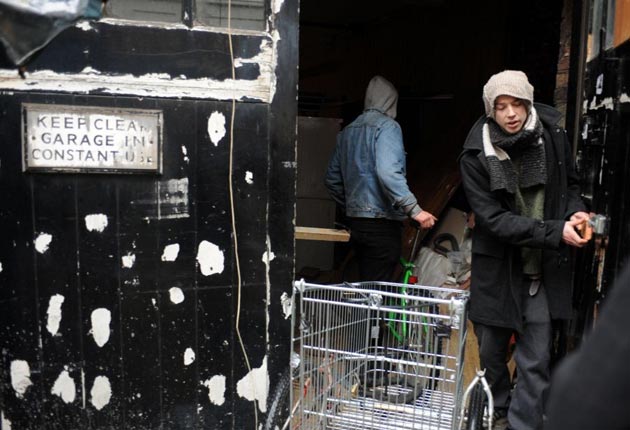Clarke cracks down on wave of squatters
Police will get new powers to evict offenders who seize unoccupied properties

Your support helps us to tell the story
From reproductive rights to climate change to Big Tech, The Independent is on the ground when the story is developing. Whether it's investigating the financials of Elon Musk's pro-Trump PAC or producing our latest documentary, 'The A Word', which shines a light on the American women fighting for reproductive rights, we know how important it is to parse out the facts from the messaging.
At such a critical moment in US history, we need reporters on the ground. Your donation allows us to keep sending journalists to speak to both sides of the story.
The Independent is trusted by Americans across the entire political spectrum. And unlike many other quality news outlets, we choose not to lock Americans out of our reporting and analysis with paywalls. We believe quality journalism should be available to everyone, paid for by those who can afford it.
Your support makes all the difference.The days of anarchist collectives living rent-free in Georgian townhouses are numbered: the Government is holding "urgent discussions" to make squatting a crime. Kenneth Clarke, the Justice Secretary, has asked his department to devise a law that will save homeowners from having to bring civil proceedings against people occupying properties without permission. Instead, police will be empowered to seize buildings and bring criminal charges against squatters, who will face jail.
The proposed change in England and Wales – squatting is already a crime punishable by 21 days' imprisonment in Scotland – follows a series of high-profile cases where squatters have invaded properties worth millions in elegant streets in central London.
At present, squatters may legally enter an empty property provided they do not cause damage when gaining access, for example, by breaking windows. Police cannot intervene unless the house was being inhabited at the time of the occupation or criminal damage has been caused. They have to tell property owners to begin a civil court case for possession, which can cost tens of thousands of pounds and take a year.
A source close to Mr Clarke said: "What he wants to do is to enable property owners, particularly householders, to be able to rely on the support of the criminal law and the police when dealing with squatters. And that's the reason we are seeking to change the law, so people whose property is occupied don't have to resort to the civil law. A properly drafted law will provide a speedier solution." They said work on the law was continuing, and added: "It's under urgent discussion. The Justice Secretary wants to bring forward plans as soon as practicable."
Existing laws protect squatters by preventing a homeowner forcing their way back into a property by violence. Squatters may also claim possession of a home if they have occupied it continuously for 12 years.
Squatters often say they are making use of properties which would otherwise be empty, at a time of housing shortages. The Squatters Advisory Service (SAS) in Whitechapel, London, which publishes The Squatters' Handbook, says it advises people only to occupy buildings that have been empty "for some time". Myk Zeitlin, a volunteer, said: "I don't think there's any justification for stopping people making use of empty properties because properties continue to be left empty when there is no need for it."
Estimates by Shelter, the homeless charity, show that in England 1,768 people a night sleep rough and 48,010 homeless households live in temporary accommodation. At the same time, more than 450,000 properties in the UK are thought to have been empty for at least six months.
The Ministry of Justice said: "We recognise the harm caused by squatters and sympathise with homeowners who find themselves in such a distressing situation. This is why we are considering whether we can strengthen the law, or its enforcement, to help homeowners protect their property."
A spokeswoman added that any squatter who refused to leave a property after being asked by a resident homeowner was committing a criminal offence under existing law, punishable by up to six months in prison.
On the house...
January 2009
A group of artists enjoyed a month's free residency at a £22.5m property in Clarges Mews, Mayfair, before being evicted. The Da! Collective, who renamed the building the Temporary School of Thought, invited passers-by to free classes on treehouse building and Hungarian folk-singing.
February 2011
The Really Free School occupied a £6m mansion in Fitzrovia, London. The film director Guy Ritchie intended to knock it into a neighbouring house. The squatters posted a legal warning on a window saying: "We live in this house, it is our home and we intend to stay here." They were evicted after five days.
March 2011
Activists calling themselves "Topple the Tyrants" took over a £10m mansion in Hampstead Garden Suburb owned by Saif al-Islam Gaddafi, son of the Libyan leader. They said: "When we found one of the world's most brutal dictators owned property in north London it seemed obvious to occupy it."
Join our commenting forum
Join thought-provoking conversations, follow other Independent readers and see their replies
Comments